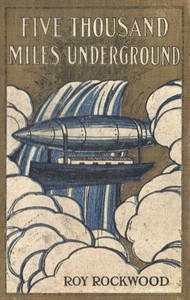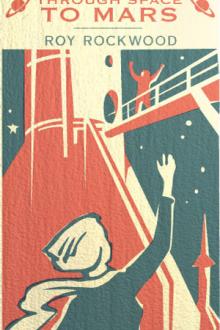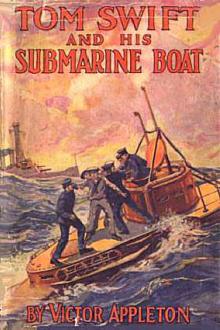Five Thousand Miles Underground; Or, the Mystery of the Centre of the Earth, - [e book reader android .TXT] 📗

- Author: -
Book online «Five Thousand Miles Underground; Or, the Mystery of the Centre of the Earth, - [e book reader android .TXT] 📗». Author -
“Now we’ll try something new,” said the scientist to the two boys as they stood beside him in the tower. “I only hope this part succeeds, and we shall soon be off on our voyage.”
He turned several levers. There was a hissing sound as the gas rushed from the container, and the ship began to settle down.
“What’s th’ matter? Are we goin’ t’ hit th’ earth?” yelled Washington, rushing from the engine room.
“Keep quiet,” ordered the professor. “We are only going down, that’s all.”
“But good land! Perfesser!” exclaimed the colored man. “The ocean’s right under us! You forgot you sailed away from the island! We’ll be drowned suah!”
“Leave it to me,” said Mr. Henderson. “The Flying Mermaid is going to take a bath!”
“As long as it swims it will be all right,” observed Mark in a low tone to Jack. “I’m glad I can take care of myself in the water.”
Before Jack could reply the Mermaid seemed to take a sudden dive through the air. The next instant she struck the water with a splash that sent the waves rolling all about. The craft rocked violently to and fro on the surface of the sea. For a while there were anxious hearts aboard, for there was no certainty but that the ship might not sink to the bottom.
But the old professor had not calculated and builded in vain. After rocking about like a vessel newly launched, the strange craft rode safely and upright on the water. It set down far enough to bring the propelling tubes well under, but not so far but that the conning tower was well out and there was a small deck available.
“Now to see if we can conquer the water as we did the air!” cried the professor. “Mark, start the air pump. Jack, you steer, for I want to watch the machinery under the additional strain.”
From the rear tube rushed such a volume of air that the ocean near it bubbled and foamed. The ship trembled from stem to stern, and then, after hanging for an instant as if undecided what to do, it began to move forward as easily as though it had never sailed any other element than the sea.
“She fits her name!” the professor cried. “She is indeed the Flying Mermaid, for she sails the ocean as easily as she navigates in the clouds!”
For a mile or two the craft was sent ahead over the waves. Then it was reversed and run backwards. Satisfied that his long months of work had not gone for naught, the professor after trying several experiments, decided to try and raise the ship while in motion.
With Jack and Mark to look after the air pumps, while Washington, Tom and Bill busied themselves in the engine room, Mr. Henderson began to generate the gas and start the negative gravity apparatus. All the while the craft was forging ahead.
There was again the hissing sound that told of the aluminum holder being filled. For a few minutes there seemed to be no change, the Mermaid plowing forward.
Then like a bird rising from the waves, or like a flying fish leaping from the sea to escape some pursuing monster of the deep, the new ship shot up diagonally from the surface and winged its way into the upper regions of the air.
“Success! Success!” cried the professor. “This proves all I wanted to know. Now we are ready for our great trip!”
Great were the rejoicings in the camp that night. It was like living over again the days when they were aboard the diving Porpoise or the flying Monarch. To the recollections were added the anticipations of what was before them in the trip to the interior of the earth.
Busy days followed, for there was still much to be done to the Flying Mermaid. The machinery, which was only partly completed, had to be finished. Besides this the professor was working on some apparatus, the use of which he did not disclose to any one. It was stored aboard the ship at the last minute.
Plenty of provisions had to be taken aboard, and many supplies needed to work the Mermaid and insure that it would go to the end of the voyage. The materials for generating the gas and negative gravity, spare parts, records for the automatic piano and other things were stored away.
Some guns and ammunition were taken along as were a few revolvers, since old Andy had said it was best to prepare for any thing in the shape of enemies or wild beasts that might be met with in the interior regions.
It was decided to make the start by sailing along the surface of the sea for several days, as in the event of any weakness in the machinery being discovered there would be less danger. If, at the end of four days, no trouble developed, the professor said he would send the Mermaid into the air and make the rest of the voyage through the sky.
The night before the start was to be made the professor, with the boys, Washington and the other helpers, went about through the various shops and buildings, locking them up securely. For they could not tell how long they would be away, and they had to leave behind much valuable material.
As there were several things that needed attention they divided the work up. Mark had finished his share and was walking back toward the living cabin where they were all quartered, when, down at the shore, near where the boat was moored, he fancied he saw, in the gathering darkness, a moving figure.
“I wonder who that can be,” he thought. “All the others are near the machine shop, for I just left them there. Perhaps it’s some one trying to spy out how the Mermaid is built.”
Knowing the professor wanted his secret well guarded, Mark walked softly toward the little dock that served as a place whence the Mermaid could be easily boarded. As he approached he saw the figure moving. Something struck the boy as peculiar.
Though the object had some of the characteristics of a man it did not walk like a human being, but shuffled along more like a huge ape or monkey. It seemed bent over, as if it stooped toward the ground.
“Who are you?” called Mark suddenly.
For an instant the figure halted and then hurried on faster than before, with a curious, shuffling walk. It was approaching the ship.
Somehow it struck Mark as if it was an uncanny being; an inhabitant of some other world. Then he laughed at his half-fear, and started on a run toward the dock.
“If it’s some tramp trying to find a place to sleep he’d better not go aboard the ship, he might do some damage,” the boy thought.
He could hardly see the figure now as it had passed into the shadow cast by the boat. He was about to summon the professor to make an investigation, when Washington started going the search light which was placed just over the door of the living cabin. It was kept there as a sort of beacon light, as, near the island was a dangerous ledge of rocks.
Then, in the blinding white glare from the big lantern as Washington accidentally swung it toward the Mermaid, Mark beheld a strange sight.
The figure he had been watching stood out in bold relief. Though it was shaped like a human being it was not like any person the boy had ever seen. It seemed covered with a skin twice too large for it; a skin, which, in spite of the clothes that concealed it, hung in folds about the arms and legs, dropping pendent like from the neck like a big garment, and flapping in the wind.
For an instant Mark was so startled he cried out, and the professor and the others ran to see what was the matter.
“There—by the ship! A horrible creature!” exclaimed Mark.
Shouting to Washington to keep the light steady in the direction of the dock, Mr. Henderson ran toward the moored Mermaid. Jack, Andy, Bill and Tom, with Mark in the rear followed him.
“Nothing here,” said the scientist, after a careful search about. “Are you sure you saw something, Mark?”
“Positively,” replied the lad with a shudder. He described the vision of the darkness.
“I guess it was a big otter, or maybe an enormous turtle,” the professor said.
CHAPTER VATTACKED BY A WHALE
But Mark was certain it was nothing like that, though a careful search failed to reveal anything or any person near the ship. It was too dark to examine for footprints, and even Mark, after taking a look all about, felt he might have been deceived by shadows. Still he was a little nervous, and could hardly sleep for imagining what the thing he saw could have been.
The next day every one was so busy that no one, not even Mark, recalled the little excitement of the night before. Shortly after noon, final preparations having been made, they all got aboard the Mermaid and started off.
It was a bright sunshiny day, and the craft, speeding away from the island where it had been constructed, over the dancing blue waves, must have presented a strange sight had there been any spectators. For surely no such ship had ever before sailed those waters.
However, there was no other vessel in sight, and the island, as far as the professor and his friends knew, had never been inhabited.
“We will not try for any great speed,” Mr. Henderson remarked as he, with Mark and Jack, stood in the conning tower managing the Mermaid. “We don’t want to strain any joints at the start or heat any engine bearings. There will be time enough for speed later.”
“Yes, and we may need it more when we get into the centre of the earth than we do now,” observed Mark.
“Why so?” asked Jack.
“No telling what we may run up against underneath the ground,” went on Mark. “We may have to fight strange animals and stranger beings. Besides, the atmosphere and water there can’t be the same as up here; do you think so, Professor?”
For a few minutes the scientist was silent. He seemed to be thinking deeply.
“I will tell you what I believe,” he said at length. “I have never spoken of it before, but now that we are fairly started and may eventually have a chance to prove my theory, I will say that I think the centre of this earth on which we live is hollow. Inside of it, forming a core, so to speak, I believe there is another earth, similar to ours in some respects which revolves inside this larger sphere.”
They were well out to sea now, as they could observe when they emerged on the little deck. Above their heads was the aluminum gas holder, which served as a sort of protection from the sun that was quite warm. The Mermaid rode with an easy motion, being submerged just enough to make her steady, yet not deep enough to encounter much resistance from the water. In fact it could not have been arranged better for speed or comfort.
“I think we will sail well to the eastward before making our course south,” Mr. Henderson said. “I do not care to meet too many ships, as those aboard will be very curious and I do not want too much news of this venture to get out. We will take an unfrequented route and avoid delays by being hailed by every passing vessel whose captain will wonder what queer craft he had met with.”
The boys enjoyed the sail, for the weather could not have been better. Even old Andy, who seldom said much, seemed delighted with the prospect of having strange adventures. He had his rifle with him, and, indeed, he seldom went anywhere that he did not carry it.
“For there’s no telling when you may see something you want to shoot or that ought to be shot,” he used to say, “and it’s always the man without a gun who needs it most. So I’m taking no chances.”
They sailed all that afternoon without meeting with a craft of any kind. Straight to the east they went, and when night began to settle down Washington got supper. It was decided to run slowly after dark until all hands were more familiar with the ship.
Morning found the Mermaid about a hundred miles from the island where she had been launched. The night had been uneventful, except that Mark told Jack he heard some strange noise near his bunk several times. He was nearest the storeroom where spare parts, and the curious cylinder the professor had brought aboard, were kept.
“I guess it was rats,” said Jack. “They are always in ships.”
“Old wooden ships, yes,” admitted Mark. “But I’ll bet there’s not a rat aboard the Mermaid.”
“Then you were dreaming,” said Jack, as if that settled it.
Mark did not speak further of the noise, but he did considerable thinking. However, the next night there was no further disturbance.
The fourth day out, when everything had passed off well, the engines doing their best, the professor decided to speed them up a bit, since he was satisfied they had “found” themselves as mechanics term it.
“We’ll see how fast we can go through the water,”





Comments (0)